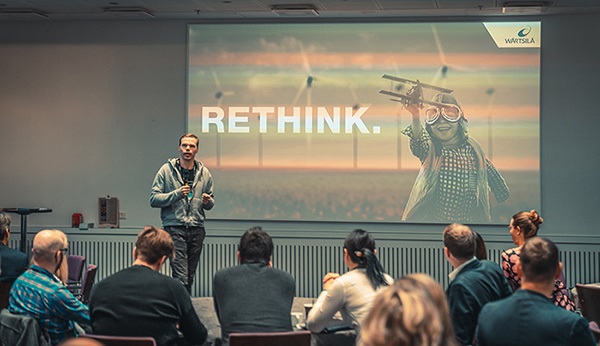
Would you buy a bowl of carbon dioxide pasta?
Wärtsilä launches a new Energy Innovation Community with partners at start-up event Slush.
The conference room at the Helsinki Fair Centre may not have been that attractive but the participants were all the more excited to hear what the speakers had to say at this Slush side event. On December 5 Wärtsilä announced the establishment of an Innovation Community together with energy companies Fortum and St1, as well as ICT company Tieto, and think tank Demos Helsinki.
The aim of this community is to drastically accelerate the global energy sector’s transition to cleaner, more environmentally sustainable energy generation. The goals include building a vision and roadmap for accelerating the transition to renewable energy sources and experimenting and bringing to market promising new initiatives.
A while ago Energy Solutions’ Director of Sales & Marketing Matti Rautkivi started thinking who would be the companies in the front line of the energy transition that could really share ideas on how to tackle emissions together. The point is not to solve the issues within Finland but to produce solutions that can be brought to the public globally.
“We need collaboration over competition and an open innovation community. It’s not about making studies or political statements anymore, but concrete actions. If you start to think about this issue in a new way, you start seeing innovations,” Rautkivi says.
Make something useful from CO2
At the launch event entitled ‘Value of CO2’, Matti asks a truly important question: what if carbon dioxide (CO2) had actual financial value and we were able to see CO2 as a raw material for other commodities?
Rautkivi promises that in the future we won’t need to take anything from underground. We can take CO2 from the atmosphere and make something useful with it like food of fuels.
“We are looking for opportunities to take CO2 from an industrial process or a power plant and combine it with hydrogen to make methanol, diesel and synthetic gas for ships and powerplants,” he says.
The plan for the brand-new community is also to provide a platform for collaboration with other corporations, start-ups, universities, NGOs, and the public sector through dialogue, open events, and jointly organized projects. The idea is to explore new business models that haven’t been fully exploited yet.
“We’re always looking for new partners to join the community. We expect that in three years’ time, we will have created significant new business,” says Outi Kuittinen from Demos Helsinki.
Politicians won’t do it
Antero Vartia, member of Finnish parliament, says that we have a lot less time than people think. We in Europe are concentrating too much on looming financial crises and not enough on solving climate change. He states that politicians will not be able to solve the problem in time.
“If we want change, don’t expect politicians to initiate it. Governments are currently competing with each other which is why they won’t be able to do it. We need the biggest companies to solve the situation.”
Vartia says that cutting emissions is simply not enough and politicians don’t realise that carbon capture is part of the answer. They also don’t realise that this solution is possible. Vartia wants to create a marketplace for CO2 and if we do it, he also promises we’re going to solve climate change a lot faster than anyone thinks we can, as carbon capture is not that expensive and as a bonus, will provide a lot of jobs.
“It takes a lot of guts and effort, but we need to provide people with knowledge so that they can start discussing this. Think about the #metoo movement. People are now aware and see the world in a totally new way.”
Protein for a Mars mission
Almost as a confirmation of Antero Vartia’s emboldened words Heidi Laurila from the Finnish energy company ST1 presented their pilot project, where they are investigating creating carbon sinks by planting trees in arid land in Morocco. The long-term plan is to sell carbon credits to companies in the form of planted trees.
Pasi Vainikka from Solar Foods, on the other hand, told about his exciting start-up, which uses renewable energy for a process in which protein is created by microbes from CO2 and hydrogen.
The resulting protein powder doesn’t really taste like anything, but the idea is to add it into foods like pasta or shakes. He’s even been contacted by the European Space Agency on how to make protein on a potential Mars mission.
“All the needed technology is here already. It is important to have a bold vision and then to go down that path without any fears,” Vainikka encourages.
Leaving the event there’s a hope in the air that we will be able to tackle climate change after all. One tree or pasta bowl at a time.
For more information please contact:
Eleonor Hedström
Manager, Business Innovation
Energy Solutions
Tel: +358 10 709 2731
eleonor.hedstrom@wartsila.com

